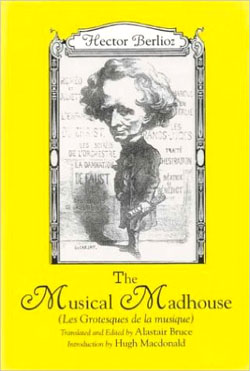If the Paris of the 19th century was considered the cultural capital of the world, it was with good reason: of the major artistic and intellectual figures of the age, those who did not live there made a point of visiting with what frequency they could manage. And, in a city filled with high-profile cultural lions, one of those with the highest profile was Hector Berlioz.
Known to most of us mainly as the composer of the Symphonie fantastique, Berlioz was from the beginning a rebel. Never less than controversial, he was the prototypical romantic artist, the misunderstood loner, the tortured soul whose life was dominated by his art. For Berlioz this is no more than the truth: often accused of being a
 Michael Rose has relied exclusively on contemporary accounts from those who knew Berlioz, whether they were friends or enemies (or perhaps, at various times, both). What emerges is a fascinating and well balanced portrait of a unique composer, a musical genius who could not play the piano and who shocked and offended Paris while electrifying the rest of Europe with his works. Many of the entries come from members of Berlioz’ circle who themselves are household words: Dumas, Délacroix, Liszt, Wagner, Gounod, Mendelssohn, Glinka, Rimsky-Korsakoff (in an anecdote related by Igor Stravinsky), Saint-Saens, George Sand, and others who are not perhaps so well known today but who dominated the musical life of Europe in the 19th century: the critics Eduard Hanslick, Francois-Joseph Féres, Richard Pohl, Vladimir Stasov, among other commentators whose names are mostly forgotten except by scholars. In fact, it seems that the only major figure of the time who is not quoted is Berlioz himself (there is even a short entry from Queen Victoria’s diary).
Michael Rose has relied exclusively on contemporary accounts from those who knew Berlioz, whether they were friends or enemies (or perhaps, at various times, both). What emerges is a fascinating and well balanced portrait of a unique composer, a musical genius who could not play the piano and who shocked and offended Paris while electrifying the rest of Europe with his works. Many of the entries come from members of Berlioz’ circle who themselves are household words: Dumas, Délacroix, Liszt, Wagner, Gounod, Mendelssohn, Glinka, Rimsky-Korsakoff (in an anecdote related by Igor Stravinsky), Saint-Saens, George Sand, and others who are not perhaps so well known today but who dominated the musical life of Europe in the 19th century: the critics Eduard Hanslick, Francois-Joseph Féres, Richard Pohl, Vladimir Stasov, among other commentators whose names are mostly forgotten except by scholars. In fact, it seems that the only major figure of the time who is not quoted is Berlioz himself (there is even a short entry from Queen Victoria’s diary).
What emerges is a fascinating portrait of a major composer, by turns shy, boisterous, acerbic, melancholy, prone to outbursts of passion and bad puns, a man who needed to be in love (usually with sad consequences), and a man whose life, in general, was not a very happy one: for most of his career he was plagued by poverty; his two marriages, which began as love matches, both ended badly; and in his later life he was plagued by an extraordinarily painful gastric inflammation that his doctor ascribed to his nervous temperament.
While the basic elements of Berlioz’ life may read like a bourgeois version of something by Byron or Goethe (one of Berlioz’ heroes) — he was the son of a well-to-do doctor in a town in the southeast of France, sent to Paris to study medicine, and snuck in composition courses on the sly, against his father’s wishes, and then married an Irish actress, also against his father’s wishes — the observations of his contemporaries carry a flavor that is too often lost in modern accounts, oriented as we are these days toward the sometimes clinical detachment considered necessary for a good biographer. The contrast is more than refreshing, it is absolutely delightful: we forget that, while we may consider the Victorian age repressed and colorless, in their exchanges, both verbal and written, the personalities of the period were anything but. (Indeed, it occurs to me that they might hold exactly the same opinion of us, particularly in a milieu in which we are not allowed to run the risk of offending someone.) Rose’s commentaries on the commentaries are spare and judicious, usually pointing out changes of opinion over time or the difference between accounts rendered in print and related in conversations.
This volume is one of a series of similar books on composers as seen through the eyes of their contemporaries, and it is a wonderful way to create a biography: it is immediate, colorful, poignant, sometimes irrepressibly funny, with a real sense of the time and context. For anyone who wants a real sense of what Berlioz was like, this is the book.
 Berlioz’ own writings, regrettably, do not fare as well. The Musical Madhouse is a translation of Berlioz’ humorous essays on the musical life of Europe that were originally published as his fourth book, Les Grotesques de la musique. As translator Alastair Bruce points out in his introduction, humor is notoriously difficult to translate effectively (which is probably one reason that this is the first translation of Les Grotesques), and indeed, this book seems to bear him out.
Berlioz’ own writings, regrettably, do not fare as well. The Musical Madhouse is a translation of Berlioz’ humorous essays on the musical life of Europe that were originally published as his fourth book, Les Grotesques de la musique. As translator Alastair Bruce points out in his introduction, humor is notoriously difficult to translate effectively (which is probably one reason that this is the first translation of Les Grotesques), and indeed, this book seems to bear him out.
What presents itself is a series of flights of fancy and sometimes extravagantly mordant observations on the “musical culture” of Berlioz’ day. They are drawn largely from his articles for the Journal des Débats, the overwhelmingly influential periodical for which Berlioz served as music critic for a number of years.
Unfortunately, these fuilletons from the pen of the Master are largely flat. In large part, I think this is simply due to their topicality, on which, although the book is extensively footnoted, the reader is bound to possess a lively ignorance. I also suspect, without being able to offer proof, that Berlioz’ humor, which was reputedly not only sharp but often stinging, just does not translate. It’s a laudable attempt on Bruce’s part, particularly his apparent efforts to keep the flavor of Berlioz’ original, but, while individually often entertaining, the essays are not so much humorous as fantastic and after a while tend to partake of an overriding sameness. This is a book to read a bit at a time, if one is a Berlioz enthusiast, and perhaps quite useful for scholars and students, although it would seem that a serious researcher into Berlioz would have access to them in French. It is not, however, a book to sit and enjoy on a rainy afternoon unless one is really planning on a nap.
(Faber and Faber, 2001)
(University of Rochester Press, 2003)
